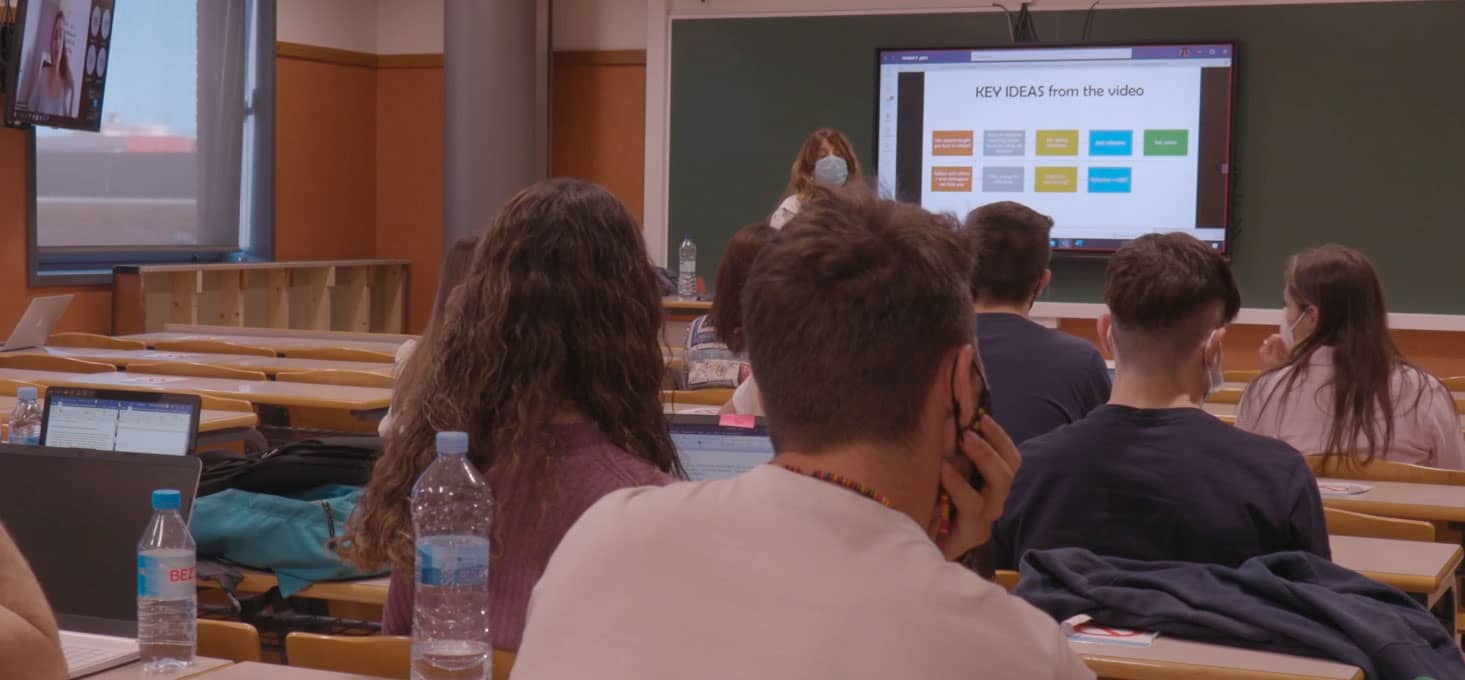Teachers who wish to learn how to teach in English and work at officially recognized bilingual and plurilingual schools and those who want to teach Spanish as a foreign language.
María Calvo Barrachina
Check the tuition fees for this Master's programme. The San Pablo CEU University Foundation is the educational institution in Spain that allocates the most funding to scholarships and financial aid. For both Official Master's Degrees and Lifelong Learning Master's Degrees, you may be eligible for the AVANCE Scholarship.

An international environment

Specialization in Bilingual Education
The largest offer in Education in the Valencian Community
What makes us different
1. Getting you ready for your career
The CEU Cardenal Herrera University brings together the professional and academic worlds to ensure our students are always in touch with the education industry. The Master's Degree in Bilingual Education, now in its tenth year of operation, has undergone a transformation, adapting to the latest technology. This includes the teaching of Hyflex classes and the use of Apple and Microsoft technological tools, reflecting the educational needs of today's schools. With content-integrated language learning (CLIL), we can bring the world into the classroom: teachers can gain the training they need in teaching content in English through this approach, enabling them to develop their communicative ability in English for the classroom. In the same way, to meet the demand for Spanish as a foreign language (ELE) teachers in Europe and the USA, we offer students a stimulating learning pathway to teach Spanish as a foreign language in Spain or across the world.
2. Specialize once... or twice!
We offer two specialisms to our students – choose one or both. In general, we find that students benefit from the synergies of doing two specialisms at the same time and that this enhances their employability still further. It's well worth the effort!
- Specialism 1: Using English as the vehicular language in the classroom.
- Specialism 2: Teaching of Spanish as a foreign language (ELE)
3. Placements
The CEU Cardenal Herrera University enjoys strong relationships with an extensive network of bilingual education institutions in the Valencia region. Your placements will be supervised by CEU lecturers and teachers at the school in question, providing you with an unbeatable learning and professional experience.
4. Language immersion
In a unique initiative in Spain, we provide students with two 100% language immersion days. You will spend two intensely exciting days with native-speaker lecturers and conversation assistants in small groups as you work on innovative solutions for a better world.
5. Guest speakers
As part of our objective to boost our students' employability, we invite a range of stimulating people from the academic and business world to speak at the University, telling students about their experiences and expectations for the future in the world of bilingual education and ELE. In April, a triple session is held with the focus on employability. In small groups, students have the chance to speak to representatives from government agencies, private education groups and a CEU careers adviser.
6. Improve your chances of success within the state system
This Master's Degree is accredited by the national and regional quality assurance agencies in higher education, giving you the edge in selection processes for the civil service.
7. Language learning materials
Master's Degree students will be given free access to a language learning platform.
8. End-of-master's degree project
The dissertation or end-of-master's degree project is the culmination of the year's hard work. It gives you the chance to show your passion for bilingual education: it could take the form of a teaching proposal, action research or even an experimental research project. It could even be the prelude to doctoral research.
9. Dual-mode of attendance
The CEU Cardenal Herrera University possesses the latest educational technology, enabling a dual-mode model of attendance – in-person and online – at educational activities to be implemented if required.
10. COIL projects
Over the course of the year, a number of COIL (Collaborative Online International Learning) projects with American and European universities will take place.
Our master's degree offers students the opportunity to participate in the renowned BIP (Blended Intensive Programme), supported by Erasmus+. On our Master's programme, we are dedicated to promoting meaningful international collaboration and designing enriching learning experiences that foster the personal and professional growth of our students. The programme connects students with peers and teachers from other European universities, providing unique opportunities to explore different educational contexts.
This innovative programme combines online and face-to-face learning, providing a rich and collaborative experience that improves teaching skills and cultural competence.
This programme provides our students with:
- Practical experience with advanced educational technologies.
- Collaboration with colleagues and experts from around the world.
- Erasmus travel support.
- Improved teaching methodologies adapted for bilingual education.
Admission requirements
Before you begin the admission process, check that you meet the admission requirements:
- University degree
- A recognized English language certificate (minimum of a B2 level)
- For the Spanish specialism, you must also have a recognized Spanish language certificate (minimum of a B2 level) if you are not a native speaker.
Graduation requirements
To be awarded the Master's Degree, you will need to demonstrate possession of at least a B2 level of English (via a recognized certificate). Students with a bachelor's degree in early years education or primary education with an English specialism (mención en inglés), English studies, translation and interpretation (English), or who have undertaken degree programmes in English, are exempt from this requirement.
Valid B2 certificates recognized by CEU UCH's Languages Service are listed in this document..
Boost your employability with Microcredentials
Pursuing a postgraduate programme is a great way to advance your career, but it is your skills that will truly give you the edge in the highly competitive job market.
At CEU UCH, a postgraduate programme will provide you with a solid academic and specialized education. But you will also have the chance to develop a key set of highly-valued personal and professional skills and to get them certified in the form of microcredentials. Developing and gaining recognition for your skills will enable you to stand out and demonstrate the added value you can bring to today’s demanding employers.
All our official master's degrees offer transversal micro-credentials. In addition, in some of our postgraduate programmes you can take micro-credentials specific to the degree you are studying.
What is a master's degree?
Master's degrees are postgraduate qualifications which are accredited by quality assurance agencies for higher education at both a national and regional level. For CEU UCH, this means that they are accredited by ANECA (Agencia Nacional de Evaluación de la Calidad y Acreditación), and AVAP (Agència Valenciana D’Avaluació i Prospectiva), respectively. This makes them different from certain other postgraduate programmes in Spain, known as títulos propios, which do not require such accreditation.
This quality assurance process means that Spanish master's degrees in Spain are recognized as valid in any country in the European Higher Education Area.
Students with a master's degree are eligible for doctoral programmes.
With regard to civil service selection processes in Spain, master's degrees carry more weight than títulos propios, which are classified as part of lifelong learning. Both types of qualification are perceived as valuable in the private sector.

{{anyo.num_curso}} Year
| Subject | ects | type | sem | language |
|---|---|---|---|---|
| {{asignatura.nombre}} {{asignatura.nombre}} | {{asignatura.ects}} | {{asignatura.tipo}} | {{asignatura.sem}} | {{asignatura.idioma.replace("Inglés","English")}} |
| TOTAL ECTS | {{sumCreditos(anyo.materia)}} |
{{value[0].tituloAnexoIng}}
| Subject | ects | type | sem | language |
|---|---|---|---|---|
| {{asignatura.nombre}} {{asignatura.nombre}} | {{asignatura.ects}} | {{asignatura.tipo}} | {{asignatura.sem}} | {{asignatura.idioma.replace("Inglés","English")}} |
End-of-Master's Degree Project
For the End-of-Master’s Degree Project, or TFM, students must undertake a project or research study which draws on and examines different explanations, theories, and ideas with regard to a specific issue. By doing so, students will learn how to plan a process, to apply research principles and skills (literature searches, data analysis and interpretation, etc.), to engage in problem-solving in an autonomous manner and to communicate and defend their point of view efficiently and professionally.
Regulations
* Subject not offered in the current academic year. The syllabus content for this course is not available.
Valencia
The lecturers for the Master's Degree in Bilingual Education (English and Spanish) are:
- Ms María Calvo Barrachina: Lecturer in Education at CEU UCH and the Coordinator for the Master's Degree. She has an MBA, a Master's Degree in Applied Linguistics for the Teaching of Spanish, and a Master's Degree in Secondary Education.
- Ms Alicia María Aranda Quesada: Director of the Languages Service at CEU UCH. She has a Bachelor's Degree in English and a Master's Degree in Language Testing, and is an Instituto Cervantes-accredited DELE examiner for levels A1-C2.
- Ms. Raquel Nielfa Toribio: Teacher at the CEU UCH Languages Service and the Coordinator of the Spanish Area. She has a Bachelor's Degree in English Studies and a Master's Degree in the Teaching of Spanish as a Foreign Language. She is an Instituto Cervantes-accredited DELE examiner for levels A1-C2.
- Dr María Candelaria Romeu Peyró: CEU UCH lecturer with a Bachelor's Degree in English and a PhD in Education. Lecturer on the English specialism of the Education degrees at CEU UCH.
- Dr Sara María Matoses Jaén: Teacher at the CEU UCH Languages Service with a PhD in the Humanities. She is also an associate lecturer within the Education Department and an Instituto Cervantes-accredited DELE examiner for levels A1-C2.
- Dr Ruzan Galstyan Sargsyan: CEU UCH lecturer. She has a Bachelor's Degree in English and a PhD in Online Learning Methods.
- Dr Enrique Cerezo Herrero: Lecturer at CEU UCH and UPV. He has a Bachelor's Degree in Translating and Interpreting and a PhD in Translation from the University of Valencia.
- Ms María Kuzina: She has a Bachelor's Degree in English Studies and a Master's Degree in Advanced English Studies. She is a PhD student in Languages, Literatures and Cultures and Their Applications at the Universitat Politècnica de València.
- Mr Gregory Hunt: Teacher and translator at the CEU UCH Languages Service. He has a Bachelor's Degree in Hispanic Studies and Master's Degree in Modern Languages (Hispanic) from the University of Liverpool.
- D. Daniel Garijo: Teacher at the CEU UCH Languages Service and an Instituto Cervantes-accredited DELE examiner for levels A1-C2. He has a Bachelor's Degree in Translating and Interpreting & a Diploma in Tourism from the University of Valencia.
- Mr Rubén Benet: Director of Education. Apple Spain.
- Dr. Alfonso Martínez-Carbonell López: CEU UCH lecturer. He has a Bachelor's Degree and a PhD in Law and is the coordinator of the Master's Degree in Secondary Education.
- Dr María Rosario García Bellido.CEU UCH lecturer and the Vice-Dean for Education. She has a Bachelor's Degree in Educational Psychology and a PhD in Education.
- Mr Noel Fitzpatrick.Bachelor of Commerce, University College, Cork (UCC) 1990. Post-Graduate Diploma in Computer Science, UCC, 1991. CELTA qualified, British Council, Bogotá, 2014. Former Cambridge Speaking Assessor (B2/C1) (2019-2023). Currently an English teacher in the Servicio de Idiomas, CEU, Valencia, (2017-)

From a placement to the job of your dreams
For many students, postgraduate programmes are a springboard for them to launch their careers. And that's exactly what we want for you too. With us, you'll get real industry experience during your placement, you'll develop key personal competencies and you'll learn from lecturers who are active professionals.
¿Do you want to know more? >>Institutions with which the University has placement agreements:
 Institutions with placement agreements - Valencia CampusPDF
Institutions with placement agreements - Valencia CampusPDF
Compulsory placements
-
 Framework regulations for the external practical training of university students.PDF
Framework regulations for the external practical training of university students.PDF Organizational regulations regarding external practical training at the Faculty of Humanities and Communication Sciences.PDF
Organizational regulations regarding external practical training at the Faculty of Humanities and Communication Sciences.PDF Regulations regarding placements for students of the Master's Degree in Bilingual Education, English and SpanishPDF
Regulations regarding placements for students of the Master's Degree in Bilingual Education, English and SpanishPDF
 Assessment System and Criteria for Placements.PDF
Assessment System and Criteria for Placements.PDF
Voluntary placements
Do a voluntary internship in a school in Great Britain or Ireland with an Erasmus+ scholarship. You will learn to educate through other methodologies and significantly enrich your teaching skills. There is the possibility of doing this internship the following year after passing all the modules of the Master's program.
More information
Mireia Burdeus Nadal
Careers Service - Postgraduate Unit.
- Start date: October 15, 2026
- End date: June
- Master's Thesis Defense Date: Regular: July, 2027. Extraordinary: July, 2027
Click on the link below for the timetable for the Master's Degree in Bilingual Education (English and Spanish).
Timetable
CEU UCH's Faculty of Health Sciences has received ANECA's Audit Internacional certificate for the internal quality assurance system in operation on its three campuses. This is evidence of the quality, transparency and continuous improvement of its programmes and the focus on ensuring the satisfaction of all stakeholders.
Memory and reports
Survey results
Surveys are carried out to gauge the satisfaction of different groups with the degree, and the resultant reports enable the programme’s main strengths and weaknesses to be identified. Together with other indicators, this can form the basis for improvement plans. + info
Monitoring
Three years after their launch or reaccreditation, all degrees are evaluated by AVAP. The aim is to ensure that the programme is being carried out in accordance with the officially approved curriculum. + info
The quality objectives of the Bilingual Education. (English and Spanish) are under permanent monitoring and review. To this end:
- An internal monitoring report (ISI) is drawn up every year, on the basis of the indicators and evidence from the Internal Quality Assurance System (SAIC, its Spanish abbreviation). The report provides an analysis of the degree’s operations, makes proposals for improvement, and monitors results and progress.
Monitoring reports
Suggestion mailbox
Operating rules:
- All members of the university community and different stakeholders may submit suggestions, complaints, claims, or compliments.
- Suggestions, complaints, claims, or compliments may be submitted individually or as a group.
- To submit a suggestion, complaint, claim, or compliment, it is necessary to provide the personal information requested in the corresponding form; otherwise, it will not be processed.
- The mailbox can be accessed directly from the website. It operates via email, so the user will receive a response at the email address provided as the sender.
- The Strategic Development and Quality Unit will forward the received suggestions, complaints, claims, or compliments to the responsible parties in the relevant Areas, Departments, or Programs and will send their responses to the sender.
- The Strategic Development and Quality Unit only acts as a liaison, as it does not have executive capacity.
- The mailbox is public, but the identity of the senders and the documents submitted are not; only the Strategic Development and Quality Unit will have access to them.
|
In accordance with Regulation (EU) 2016/679 of the European Parliament and of the Council of April 27, 2016, on the protection of natural persons with regard to the processing of personal data and on the free movement of such data, and repealing Directive 95/46/EC, we inform you that your data will be processed under the responsibility of the SAN PABLO CEU UNIVERSITY FOUNDATION (hereinafter, FUSP-CEU), in order to handle your information request, as well as to keep you informed about initiatives and events that may be of interest to you in the educational field or help us better understand your training needs. We also inform you that profiling is planned to understand which products or services may suit you best, and how to communicate them to you most effectively, according to your preferences or habits, and that are offered by our foundation or related entities (*). FUSP-CEU informs that the indicated processing is legitimized by the consent of the data subjects or, where appropriate, their legal representatives. Likewise, FUSP-CEU informs you that the personal data included in this request for information will be retained unless you request their deletion. By signing this request, you expressly consent to the communication of your personal data by FUSP-CEU to Foundations, Institutions, and Centers, dependent on or linked to FUSP-CEU (*), for their own management purposes and to keep you informed about their activities and projects. We inform you that international data transfers are not planned. You may contact the FUSP-CEU Data Protection Officer by writing to the postal address C/ Tutor nº 35 - 28008 Madrid or via email at [email protected]. In accordance with the rights conferred by current data protection regulations, you may contact the competent Supervisory Authority to file a complaint, and you may also exercise your rights of access, rectification, restriction of processing, deletion, data portability, and opposition, as well as withdraw your consent, by sending your request to FUSP-CEU General Secretariat, C/ Tutor nº 35, 5th floor - 28008 Madrid, or via email at [email protected]. *Institutions, dependent Centers and CEU Foundations: Fundación Privada Universidad Abat Oliba CEU, Fundación San Pablo Andalucía, Fundación San Pablo Castilla y León, Fundación San Pablo Sanchinarro, Fundación Abat Oliba, Fundación San Pablo para Ayuda al Estudio, Colegio Mayor Universitario de San Pablo, Fundación Cultural Ángel Herrera Oria and Asociación Católica de Propagandistas. |
Regulations
- Regulations for the Continuation of Studies on Master's Degrees
- Royal Decree 822/2021, of 28th September, regarding the organization of educational programmes at universities and the quality assurance of such programmes
- Regulations Concerning University-Specific and Lifelong Learning Programmes
- Regulations on the Recognition and Transfer of Credits
- Contract for the Waiving of Intellectual Property Rights
- Regulations Concerning Continuous Assessment at CEU UCH.
- General Regulations Concerning End-Of-Degree Projects (TFG) and End-Of-Master’s Degree Projects (TFM).
- Framework Regulations for the External Practical Training of University Students
View all the CEU Cardenal Herrera University regulations here
More Information
|
All the University’s degree programmes are assessed by the Spanish government’s quality assurance agency for higher education, ANECA. The University draws up a report (memoria) containing all the information concerning a new degree it wishes to offer and sends this to ANECA for it to review and approve. This approval process for the degree programme culminates with it being placed on the official record of universities and degrees in Spain, known as RUCT, with this being last step prior to its ratification by the governmental body responsible for coordination with Universities, the Consejo de Universidades. ANECA, in turn, sends back a final report (informe final) recording the approval or “verification” of the degree, and may also send further approval reports (informes de aprobación) for each modification that the University makes to the initial memoria for the degree. The implementation report (informe de implementación) is issued by the quality assurance agency in higher education of the Valencian regional government, AVAP. A favourable implementation report is essential for the Consejo de Universidades to approve the provision of the degree programme. Either six or eight years after a degree begins operation (depending on its duration), it must undergo a further round of external assessment in order to renew its verified status. This assessment is undertaken by AVAP. If successful, a renewal report (informe de renovación) is issued. |
|
The University undertakes a range of surveys to acquire stakeholder feedback regarding its degrees. The following are undertaken annually:
The following are undertaken every two years:
The results are indicators for the Internal Quality Assurance System (SAIC) and are studied by the internal monitoring committee (CSI) for the degree. Improvements may then be suggested in the internal monitoring report (ISI) for the degree. |
|
The degree is subject to two monitoring processes:
|
Ready to apply?
Our admission process is simple and easy, and with many resources to make your application as smooth as possible.
Access your intranet to submit documents, find useful information and check your application status from home!
Get the verdict from those who know
Other programmes of interest
|
|
General competencies
Specific competenciesCore
Teaching Spanish as a Foreign Language in Bilingual Education
Using English as the vehicular language in the classroom
|
|
Those who fulfil the other requirements for teaching at pre-school, primary or secondary level will be able to teach in english-spanish bilingual education. In other words:
You could become a teacher of subjects across the curriculum which can be taught in English within the current bilingual and plurilingual educational model, at both private and state schools. You will still need to pass any required selection processes. Or you could become a creator of specific teaching materials, instructional designs, resources, educational strategies, and plurilingual education projects, facilitating content and language integrated learning in English across a range of subjects. Finally, with this master's degree students will be able to work professionally as a Spanish as a foreign language teacher at a range of schools and education facilities in Spain, and also teach Spanish using English as the language of instruction in other countries, embassies, Spanish language schools, etc. |
|
|






















Ana Isabel Korecki Rodrigo
“With this Master's Degree, I was able to immerse myself in the world of bilingual education, seeing everything from the theoretical foundations to the most practical side of things. The courses on ICT were particularly useful because I learnt about new resources that have helped me to improve my day-to-day teaching. I also ended up getting a job at the bilingual school where I did my placement. It's just a fantastic way to get the skills you need to get ahead in this exciting area of education.”
Joan Aleixandre Agulló
“The blended delivery of the Master's Degree in Bilingual Education enables students to combine postgraduate study with work. The training I received has enhanced my skills as a teacher and enabled to me operate more effectively in bilingual education settings. It's really helped me to develop my language skills due to the lectures in English. Another positive is the modern and professional online platform where you can carry out and submit your assignments and see your grades. Finally, the language immersion days are a great example of experiencing living in another language, talking with a lot of different native speakers and taking part in activities and games which bring you closer to another culture and language.”
Susana Sempere Pla
“The Master's Degree in Bilingual Education (English-Spanish) exceeded my expectations in many different ways and it's opened up a range of opportunities for me: I've had several job offers, in Spain and abroad; I've improved my communication skills in English; I've developed a range of other valuable life skills (cooperative learning, learning to learn, critical thinking, etc.); we learnt from experts in a key area for us (CLIL); I gained some wonderful new friends; and overall I see the interaction with other cultures as a very rewarding experience. So, I'm completely satisfied with this Master's Degree."